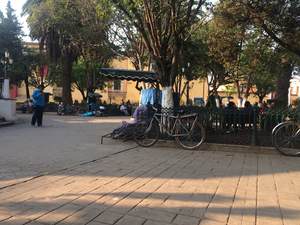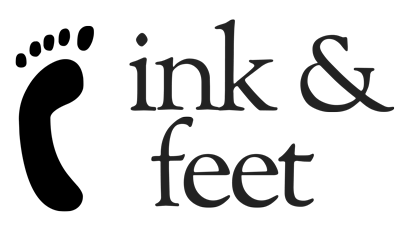
How To Be Mexican
I'm sitting on a park bench on the Zocalo - the central plaza here in San Cristóbal. It's late afternoon, and sun is carving its temporary gold rivers into the concrete. Most of the benches are full, a mix of lovers and old men. The lovers fold into each other. The old men fold into themselves.
Every few minutes, a boy comes by, offering to shine my shoes. A man selling candy follows. I decline both, keeping my eyes on the people around me. You see, I'm not here to relax. I'm trying to learn how to be Mexican.
Within minutes, I pick up and make small adaptations. I uncross my legs. Let my back sink into the bench, legs settle into the shared walkway. I smile less at passersby. I notice that all the men have their arms crossed.
This irritates me. See, I've been training myself out of crossing my arms for a few years - in the United States, it means back off, and hurts open dialog. It's become so ingrained that sitting with my arms crossed - even for five minutes - is really uncomfortable. It makes me feel like I'm shouting "SCREW YOU" to everyone. But I know that all in my head, and more, it's probably necessary.
One of the enduring stories about travel is that of a language barrier - that not speaking the same language is one of the biggest challenges to living and communicating somewhere new. But in my experience, language isn't that crucial - and it's always the last thing you learn.
Before I learn how to talk, I have to learn how to :
- Walk
- Cross the road
- Move in a crowd
- Approach someone or something
- Leave somewhere
- Pay for something
- Sit down at a restaurant
- Recognize and defer to someone of higher status
- Politely turn someone down
- Pass someone on a narrow street.
Notably, language doesn't help you learn almost any of the above, because they're not things people consciously think about.
I mean, how silly would you find it if a foreigner approached you and asked, "Hi, terribly sorry, but how do you walk here?" Uh, you just walk.
Except that I can promise you, walking the streets in Mexico and Thailand and America are radically different propositions. So how do you learn? You mimic.
The Power of Mimicry.
It turns out we humans are exceptionally good at mimicking each other. It's built-in biology, wired in some of the lower parts of our brain functions. As children, we learned to walk, talk, and interact by watching the people we were around most.
Your parents never picked up your legs and put them down in a particular arrangement - but the odds are good your gait looks a lot like the people who raised you.
Same goes for your accent, your word choices, and your beliefs about the world. If you didn't put in effort to change it, your mind naturally chose to mimic the things it saw most.
When I travel, I use this effect to my benefit, by expending conscious energy to make sure my brain notices how people move and interact wherever I've landed. In what seems like magic, simply priming the pump by noticing is enough. My brain and its well-developed mimicry systems will take care of the rest.
But to me, that's not the coolest part. The coolest part is what I've figured out by doing this in city after city:
That I can apply my brain's mimicry powers to anything I want.
The Story of Best Me.
I've carried around this story of "best me" for a few years. Best me is like an über version of myself. Kind, generous, patient, passionate, kick-ass in all the ways I value. I am not that person every day. But these days, I'm able to use my mimicry powers to imitate him - and every day it gets me a bit closer.
Say I'm tired and grumpy and hungry. I want to sit on the couch and whine about it. In these situations, as often as I can remember to, I imagine, in as much detail as I can, a simple scenario: What would best me do, right here, and right now?
An answer is always immediate and clear - the brain is uncannily good at this stuff. Within seconds, I can clearly see an alternate set of actions that's lined up with the person I am trying to become.
If I'm sitting on the grumpy couch, in my mind's eye, I can see best me getting up, and making some oatmeal. It doesn't kill him. And, within 15 minutes, he seems fed, energized, and is moving on to other things.
Sometimes, I get up and make some. Sometimes I don't. But as soon as I've seen that second set of actions, it now becomes my choice - and better, the mimicry part of my brain just wants to copy what best me is "doing." In the long-run, that effect adds up to something massive.
Which brings me back to the plaza.
Once I asked the question, I realized best me would sit on that plaza, cross his arms, and then with an open mind, notice himself and the world around him. So, even though I could ascribe none of those generous personal traits to myself in that moment, I gave it a shot.
I sat there, for five minutes, arms folded.
How'd it feel? Awkward.
But also like something - was unlocking.

